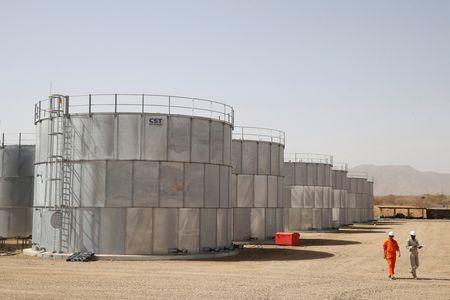By Duncan Miriri and Karin Strohecker
NAIROBI/LONDON (Reuters) – From Nairobi to Accra, leaders of countries facing debt strains and public wrath over rising food and fuel prices have turned to the IMF as a last-ditch lender – but say they get little say in the policymaking that ultimately determines their fate.
This week, a year after announcing the move in Marrakech, Morocco, the International Monetary Fund will add another African seat to its now-25-member board, an action proponents hope will address the concerns of African leaders who campaigned for the additional seat.
Experts say the board is the most influential organ of the IMF since it runs the daily business on behalf of the board of governors, which meets only once a year. But not everyone thinks the decision goes far enough.
“Adding one extra seat on the IMF board does nothing to change this fundamental inequality,” said Tim Jones, director of policy at campaign group Debt Justice, referring to the large number of nations represented by the three Africa seats.
The Washington-based IMF – lender of last resort to debt-strained nations – typically demands a slate of reforms before doling out cash to governments from Kenya to Senegal grappling with heavy debt and soaring repayment costs.
Leaders from the developing world complain rich nations, namely the United States, have a disproportionate say in how the IMF operates, given that it is their citizens – and not those in the rich world – affected by its decisions.
The distribution of decision-making power at the Fund is complex, but a key point of contention has been its voting system.
Voting power is allocated through basic votes, the same for all members, and extra quota-based votes, which, via complex formulas, effectively give a bigger say to larger economies that put more money into the IMF’s reserves.
Africa’s 54 countries, the biggest bloc among the IMF’s 191 members, hold 6.5% of IMF voting rights, but host 18% of the world’s population. Sub-Saharan Africa’s voting share accounts for around half of that.
However, the region has had the largest number of IMF lending programs over the past two decades, according to the London-based Mo Ibrahim Foundation.
OVERSHADOWED
Africa’s voting rights pale in comparison to those of individual global powers such as the United States, with 16.5%, or France and Britain, each with 4%.
The situation is mirrored at the World Bank, where Africa has an 11% voting share at its development lending arm, the International Development Association, the Mo Ibrahim Foundation said.
The debate on whether IMF voting power should be based on contributions, or on the share of nations using the support, is not new. Member countries pay in the amount allocated to them in quota form, based on a set formula, and that in turn is reflected in their voting rights.
“The current balance favours advanced countries, leaving borrowers with little influence over decisions that most impact them,” said Kevin Gallagher, professor of global development policy at Boston University.
Critics blame IMF arrangements for skewed access to liquidity, especially for nations in dire need of support.
They point to the $650 billion added to IMF Special Drawing Rights in 2021 to bolster nations navigating the fallout from the COVID-19 pandemic; Africa’s portion was just $33 billion.
“Our quota, compared to the size of the economy, is disappointingly low,” said Eyob Tekalign, Ethiopia’s state minister of finance, calling for “significant reforms”.
The East African nation has an SDR quota equivalent to $400 million against an annual economic output of $150 billion.
African economies deserve “more representation, more voting power, and improved quotas,” Eyob said, due to their growth in the decades since the IMF was formed.
DIFFERENT FACTORS
Kamau Thugge, Kenya’s central banker, said quotas should take into account factors other than the size of the economy, such as liquidity needs or balance of payments.
Asked about Africa’s grievances, the IMF said it was hiring more staff from Africa and establishing new offices and training centres in the region.
“The most significant step we have taken to increase the voice and representation of Africa is to add a third chair,” said Managing Director Kristalina Georgieva on Friday.
Several African countries, including Zambia, Chad, Ghana and Ethiopia, have defaulted on their debt in recent years.
Increased representation could help Sub-Saharan Africa not only shape how debt reworks are dealt with, but also tackle other threats, said Kevin Daly, portfolio manager for emerging market debt at investment firm Abrdn.
“Having another Africa voice on the executive committee, too, will also allow them to push harder for increased climate financing,” he said, adding that the continent was bearing the brunt of climate change caused by industries abroad.
A more prominent voice for Africa is inevitable, said Abebe Aemro Selassie, director of the Africa Department at the IMF.
One out of every two new entrants into the global labour force will come from Sub-Saharan Africa, he said, driving demand and consumption.
“One way or another, this will be the African century,” Abebe told Reuters.
(Reporting by Duncan Miriri and Karin Strohecker; additional reporting by Libby George, Editing by Sharon Singleton)










